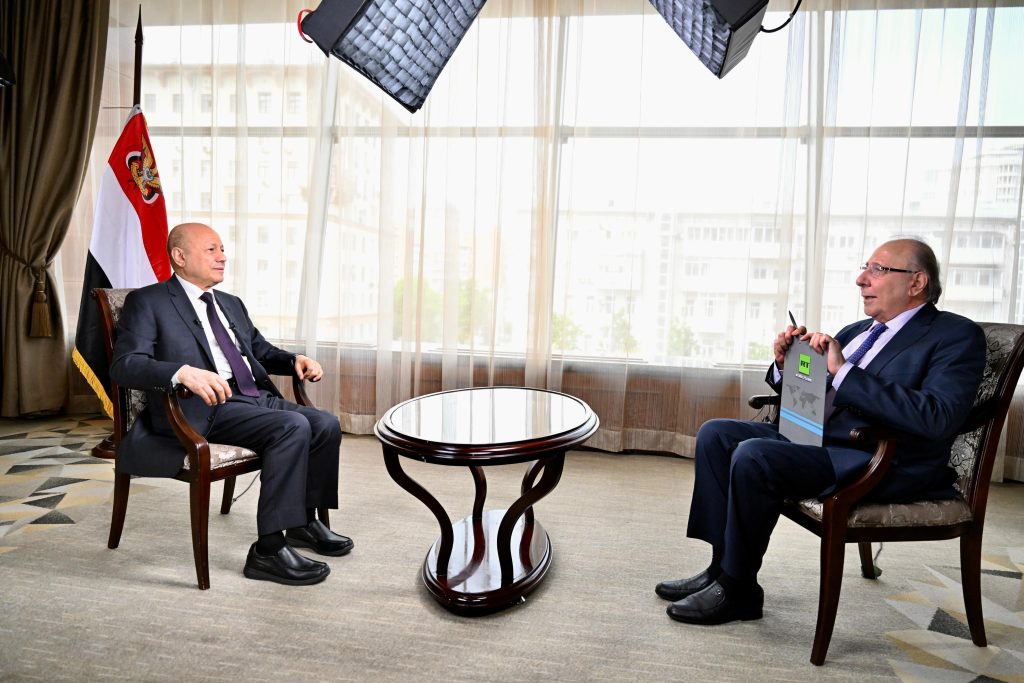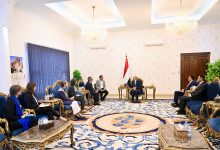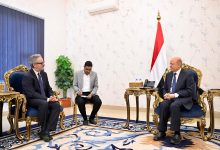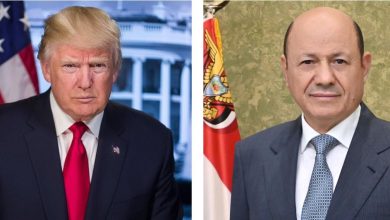The Chairman of the Leadership Council stated that the Houthi militia’s surrender to the U.S. confirms that force is the best path to peace.

President Rashad Alimi Affirms Russia’s Support for Yemen
In a recent interview with Russia Today, President Dr. Rashad Mohammed Alimi, head of the Presidential Leadership Council, expressed confidence in Russia’s ongoing collaboration with the international community. He emphasized the need to support the Yemeni people’s aspirations to restore state institutions, end the Houthi militia’s insurgency, and establish peace and stability in accordance with internationally recognized frameworks, particularly UN Security Council Resolution 2216.
Russia’s Stance on Civil Governance
President Alimi stated that Russia’s position aligns with civil governance and opposes the new forms of racism and neo-Nazism represented by the Houthis in Yemen. He characterized the Houthi group as a theocratic faction that disregards civil rights and freedoms and rejects political partnership, asserting that they exist solely to dominate the populace.
Historical Context of Russia’s Role
Alimi highlighted Russia’s significant historical role in defeating Nazism, noting that millions of Russians sacrificed their lives for humanity’s salvation. He praised Russia’s consistent support for Yemen’s legitimate government in the UN Security Council since the Houthi coup, stating that Russia has always backed international resolutions, including Resolution 2216, which serves as a roadmap for resolving the Yemeni crisis.
Commitment to Peace
The President reiterated the commitment of the Presidential Leadership Council and the legitimate government to Resolution 2216 as an optimal roadmap for a comprehensive solution in Yemen. He affirmed the Yemeni government’s dedication to a peaceful resolution, stating, "We support peace because we understand that a political solution is the best option for Yemenis, the region, and the world."
Challenges in Peace Efforts
Despite numerous attempts by the Yemeni government and the United Nations to engage the Houthis in dialogue, Alimi noted that these efforts have been unsuccessful. He pointed out that the latest initiative, a roadmap proposed by Saudi Arabia, was met with rejection and obstinacy from the Houthis. He condemned the militia’s continued terrorist attacks on oil facilities, civilian areas, and military fronts.
Escalating Threats
Alimi criticized the Houthis for extending their aggression to the Red Sea, attacking international shipping, and claiming support for Gaza while launching missiles. He stated that their actions have prompted external intervention and led to significant destruction of Yemeni infrastructure, including ports, airports, and factories.
Example of Houthi Destruction
The President recounted how the Houthis destroyed four Yemeni Airlines planes by hijacking them and refusing to release them at Sana’a Airport, despite the imminent threat of Israeli airstrikes. He explained that attempts to negotiate the planes’ relocation to safer locations were rejected by the Houthis, resulting in the loss of three aircraft.
The Need for a Unified Response
Alimi described the Houthi group as nihilistic and not a partner for peace, asserting, "We are determined to restore the state, whether through peaceful means or military action." He emphasized the importance of unity within the Presidential Leadership Council, which reflects the country’s political diversity while adhering to shared governing frameworks.
International Support for Yemen
Regarding communications with the U.S. administration, Alimi expressed confidence that the Yemeni state project enjoys global backing, including support from the United States, the European Union, and Russia, alongside Arab allies, particularly the Saudi-led coalition. He praised former President Donald Trump’s decision to designate the Houthis as a terrorist organization, calling it a positive step that accurately reflects the group’s behavior, which resembles that of Al-Qaeda and ISIS.
Conclusion: The Path Forward
Alimi concluded by stating that the Houthis only respond to force, as evidenced by their agreement to halt attacks on U.S. ships following military strikes on their capabilities. He sent a clear message that the Houthis will not accept peace unless compelled by strength, urging both domestic and regional stakeholders to recognize the necessity of a firm stance against the militia’s aggression.
To follow the news in Arabic



